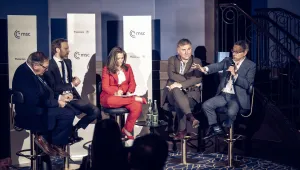
Following the breakdown of February’s Trump-Kim Summit in Hanoi, Belfer Center experts discussed the impact of the shortened summit.
“Because of how the Hanoi Summit ended, Kim Jong Un lost face,” said John Park, Director of the Belfer Center’s Korea Project. “Rather than the expected launch of a process in which the working groups were to begin complex negotiations, we’re currently seeing advanced preparations of a different kind of launch—this one in North Korea at the Sohae satellite launch facility.” The key question now, Park said, is how Kim will regain face, “a paramount task for a leader who is only 35 years of age. The upside of his youth may be a calculation that he can resume testing, restore face, and then wait out the Trump Administration.”
Excerpts from additional insights and reactions at the Hanoi Summit:
Graham Allison, Douglas Dillon Professor of Government, HKS: “Putting the summit into a broader context, I am reminded of a Chinese maxim that says ‘a journey of a thousand miles begins with a single step.’ Although the road to denuclearization is long, my bet is that history will remember the Hanoi Summit as a significant step along the way.” (The National Interest, March 1, 2019)
Matthew Bunn, Co-Principal Investigator, Project on Managing the Atom; Professor of Practice, HKS: “North Korea is not likely to give up all its nuclear weapons any time soon. But it might very well be willing to reduce nuclear dangers step-by-step in return for parallel steps to lift sanctions, improve relations, and provide benefits.”
Nicholas Burns, Faculty Chair, Future of Diplomacy Project; Professor of the Practice of Diplomacy and International Relations: “Trump should end the buddy diplomacy with Kim and empower his first-rate negotiator Steve Biegun. They should refashion the coalition against Kim with South Korea, Japan and China, return to sanctions pressure, and renew military exercises with South Korea.”
Ash Carter, Director, Belfer Center: “The only way to succeed is coercive diplomacy…. Kim Jong Un will have to rethink what he’s willing to do to take concrete steps forward. In return we should gradually take concrete steps in his direction—but only gradually and only reciprocally.” (CNBC, Feb. 28, 2019)
Martin Malin, Executive Director, Project on Managing the Atom: “The question is whether the working level diplomats will be empowered to meet and move the process forward. The focus should…be on what is still achievable: a continuing de-escalation of tension, and an expanding bilateral diplomatic process aimed at peace, denuclearization, and economic development on the Korean peninsula.”
Joseph S. Nye, Member of the Board, Belfer Center; Harvard University Distinguished Service Professor: “Give credit where credit is due. Trump was played by Kim at their first meeting in Singapore, but avoided that fate in Hanoi. Now negotiations should continue at lower levels and properly prepare the ground.”
Susan Rice, Senior Fellow, Belfer Center: “[W]hen the leaders fail, under the spotlight, to reach a deal, it’s harder to put Humpty Dumpty back together. If there remains a moratorium on testing of nuclear weapons as well as ballistic missiles, that’s certainly better than the alternative. But people shouldn’t confuse a moratorium on testing with a freeze of their nuclear program.” (NPR Morning Edition, February 28, 2019)
Gary Samore, Senior Fellow, Belfer Center Korea Project; Associate, Project on Managing the Atom: “The failure of the Hanoi Summit may be a blessing in disguise. For both President Trump and Chairman Kim, it is a teachable moment that personal chemistry cannot substitute for preparation in dealing with the complex and difficult issues of denuclearization.”
Wendy Sherman, Senior Fellow, Belfer Center; Director, Center for Public Leadership, HKS: “[If] the meeting had been well prepared, it’s likely the president wouldn’t have found himself in the position of a dramatic flameout….Real leadership requires a serious, disciplined negotiation involving the full diplomatic force of the U.S. and our allies, an approach necessary to even imagine getting back on a pathway.”
William Tobey, Senior Fellow, Project on Managing the Atom: "In some ways, this was a better outcome than the Singapore Summit. President Trump reversed the North’s perception that it is better to deal with him because he offers unilateral concessions, e.g. the cessation of U.S.-ROK military exercises, and because they can then avoid discussion of thorny verification details.”
Read full comments here.
"Impacts of the Hanoi Summit." Belfer Center Newsletter. Belfer Center for Science and International Affairs, Harvard Kennedy School (Spring 2019).

